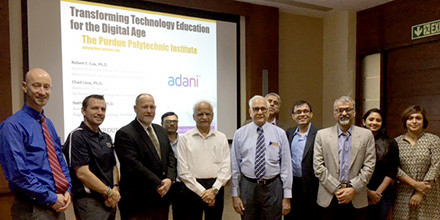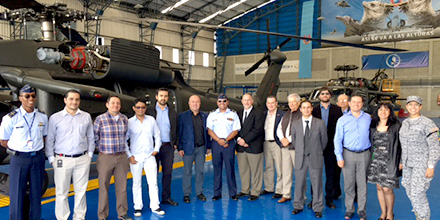Written by Robert F. Cox, senior associate dean for globalization
The week of January 22 was a busy and very successful week for the Purdue Polytechnic on opposite sides of the globe.
India
It started in Ahmedabad, India, with a productive meeting with the Adani Group and the Adani Institute for Infrastructure Management. During these follow-up meetings to our discussions with Adani at Purdue in October, I was accompanied by Technology Leadership and Innovation (TLI) professors Chad Laux and Nathan Mentzer and TLI graduate student Aswathy Suresh. We quickly realized our two programs aligned and had synergies in several key areas: our first-year experience (TECH 12000); our overall student-centered instructional methods; and Adani’s development needs with respect to curriculum, instructional mentoring and professional development activities at both the academic and corporate levels.
Adani hopes to work closely with multiple units across our college at both the bachelor’s and master’s degree levels. We specifically identified (but are not limited to) several potential opportunities:
hopes to work closely with multiple units across our college at both the bachelor’s and master’s degree levels. We specifically identified (but are not limited to) several potential opportunities:
- Department of Technology Leadership and Innovation: MS in industrial engineering technology, supply chain management, Lean Six Sigma, and engineering/technology teacher education
- School of Construction Management Technology: MS in construction management, power plant safety, infrastructure project management
- School of Engineering Technology: solar farms, electrical engineering, power distribution
- School of Aviation and Transportation Technology: unmanned aerial systems in support of power line and port operations.
We are currently defining the scope of the Adani partnership and developing the proposal with their leadership. We anticipate our first professional development workshops and student travel activities will take place this summer and fall.
Colombia
While I was in India, we had another Purdue team meeting with three of our potential strategic partners in Medellin, Colombia. The team included José Garcia, assistant professor of engineering technology; Dave Stanley and Denver Lopp, professors of aviation technology; and Juan Diego Velasquez, managing director of strategic initiatives for the College of Engineering. They worked to develop and identify the strengths of a four-institution approach to meeting aviation needs in the Latin American region and specifically Colombia since it is targeted for future maintenance and operations hubs by several key global aviation players.
 Similar to India, this developing relationship addresses both academic programs and professional programs. The college has seen successful collaboration with three of our Colombian partners -- Pontifical Bolivarian University, University of Antioquia, and National University of Colombia at Medellín -- to address professional development, maintenance, and airport operational needs of Avianca Airlines and the Colombian Air Force (FAC). Following four days of collaborative meetings, we all met as an academic team in separate meetings with executives from Avianca and the ranking colonels for the FAC air base in Rio Negro. We presented the concept of a Network of Excellence / Academic Alliance -- the Polytechnic-led Aviation Alliance for Antioquia -- where all groups would work together to meet broader industry needs and improve the impact on the region, the nation and greater Latin America.
Similar to India, this developing relationship addresses both academic programs and professional programs. The college has seen successful collaboration with three of our Colombian partners -- Pontifical Bolivarian University, University of Antioquia, and National University of Colombia at Medellín -- to address professional development, maintenance, and airport operational needs of Avianca Airlines and the Colombian Air Force (FAC). Following four days of collaborative meetings, we all met as an academic team in separate meetings with executives from Avianca and the ranking colonels for the FAC air base in Rio Negro. We presented the concept of a Network of Excellence / Academic Alliance -- the Polytechnic-led Aviation Alliance for Antioquia -- where all groups would work together to meet broader industry needs and improve the impact on the region, the nation and greater Latin America.
We hope the proposed structure of networks or alliances will prove to be the model for all future operations in Colombia in conjunction with our partners represented in the Colombia-Purdue Initiative (CPI). This alliance model is consistent with Purdue’s overall commitment to our Colombian counterparts, and the structure will help to move things forward in operational areas beneficial to all. Purdue is also leading the development of multiple alliances specific to other targeted needs in Colombia which will eventually include all eight CIP Colombian partners (the G8) and most of Purdue’s academic colleges.
We anticipate our engineering colleagues will identify the right Colombian university partners from among the G8 to establish an Engineering-led alliance focused on aeronautics and astronautics-related areas specifically addressed by the Colombian Air Force. There will be some overlap with the Aviation Alliance, but is should not infringe on the overall relationships. Instead it could create a consistent series of linkages among the alliances.
This would be followed by a series of regional and national strategic alliances in the areas of agriculture, science, life sciences, pharmaceuticals, and more, bringing in Purdue participation from across campus with deliberate alignment to the strengths of the G8 Colombian partners.
These recent successes are a clear indication that the Purdue Polytechnic is seen as a leader across the globe because of its ideals, faculty strengths and reputation of programs and models. I look forward to helping all interested faculty members get involved in these and other global activities.
